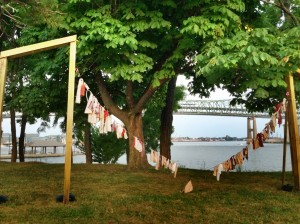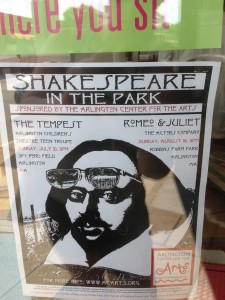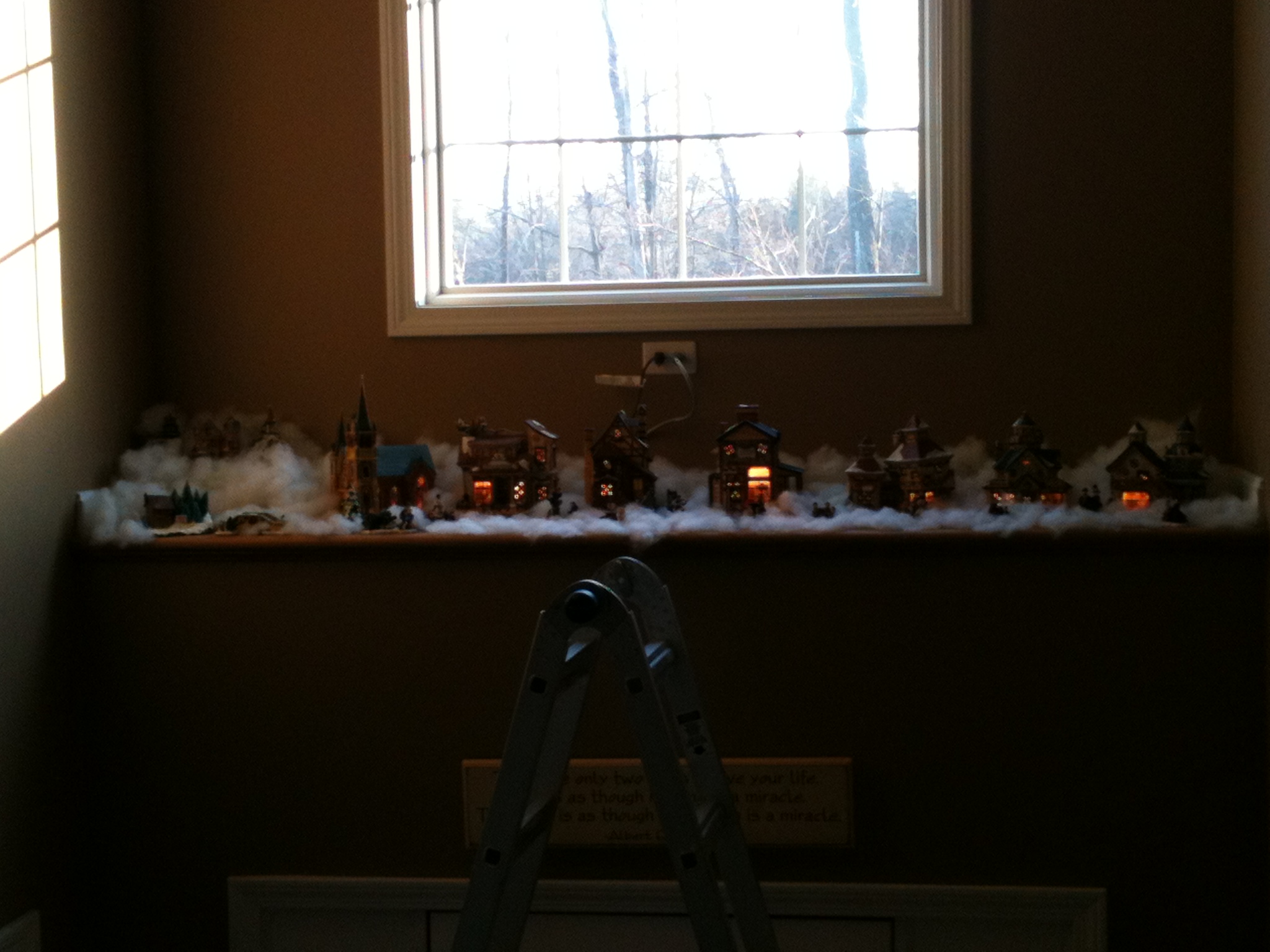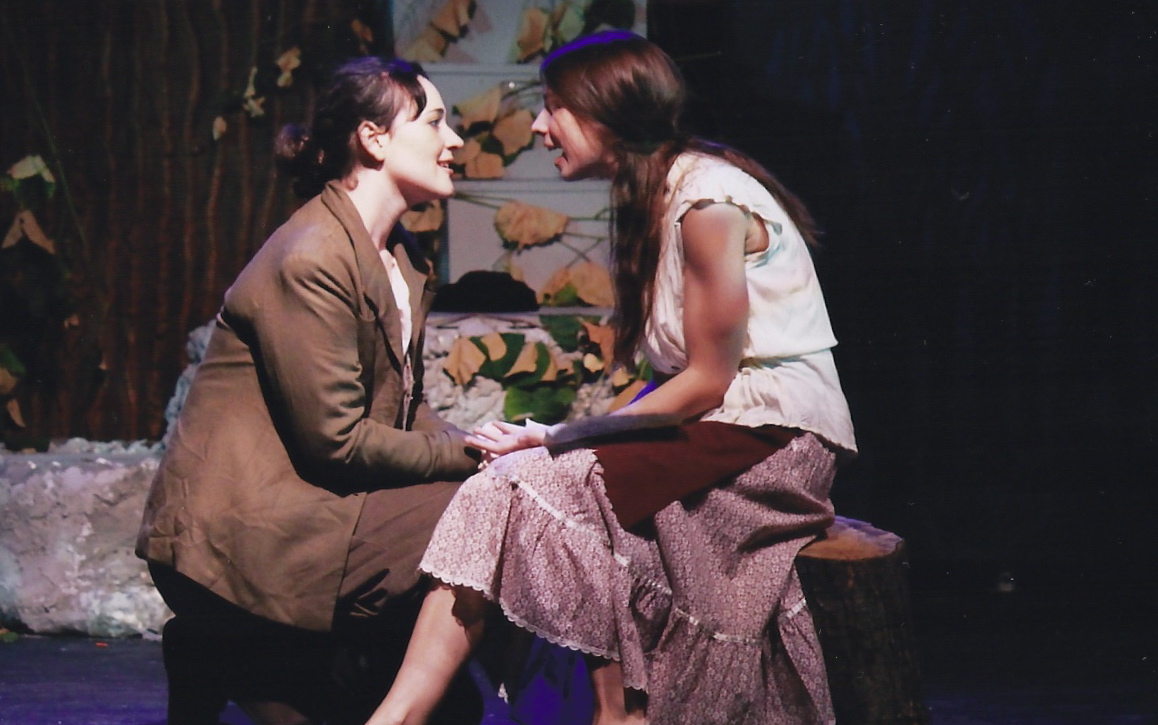Yesterday was my birthday.
To celebrate I did many things. One of them was to see theatre. We went to go see the A.R.T.’s production of The Heart of Robin Hood.
I wanted to see it because it sounded like fun. I mean, it’s a play. About Robin Hood. How could this not be interesting?
It turned out to be much more than I expected. Yes, yes, there was talent onstage (both in the acting and execution of the show), the writing was good, and the sundry list of things you expect from professional theatre was all fulfilled with gusto. Let’s talk about how this show went above and beyond expectations:
First of all, the set design. I’ve never before seen a set that was more enveloping, more
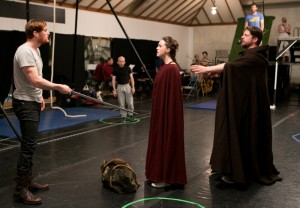
Rehearsal shot of Jordan Dean (Robin), Christiana Bennett Lind (Marion), and Christopher Sieber (Peter) by Evgenia Eliseeva
appropriate, or more useful to the production. From the moment I walked in to the theatre, I had absolutely no doubt that I was in Sherwood Forest. Above this, every single little piece of the set was used for something (generally many somethings) in an unexpected and creative way throughout the course of the production. The set was so wedded to the show that I had a hard time conceiving of how this could have possibly been rehearsed without it. If you go for not other reason, go to see how set design can influence and effect a production. Sets: not just pretty ways to decorate a room.
But it wasn’t just the set that made the set. The lighting design for this production was so spot-on and wonderful that it was noteworthy. Lighting design is an often-unacknowledged portion of the show as, generally, great lighting design is invisible and awful lighting design is nauseating. In Robin Hood, the lighting was simply magical and almost cinematic in its magnitude. It integrated seamlessly into the beautiful production, while simultaneously adding unending value to the story. I often found myself wishing that my life could be lit the way Björn Helgason lit Sherwood. Please?
Now let’s talk about the dramaturgy. It’s not like Robin Hood is a new concept by any stretch of the term. In fact, I would go so far as to say that, in most cases, Robin Hood is a trite cliché that should probably not be relied upon to add value to anything. The A.R.T. production proved that you can teach an old outlaw new tricks. At every turn, the production subverted your Robin Hood expectations while simultaneously remaining true to the story we all know and love. Additionally, the program notes were well-written and lain out so as to give a glimpse into the playwright and designers’ dramaturgical processes. Here was pertinent, interesting information about the show that you were about to see made accessible for a theatre (or Robin Hood) novice. Dramaturgy at its finest. Bravo.
And, for our superficial moment of the review, let’s talk about the bodies onstage. This was an extremely physical show that constantly put the human form on display. Following in the footsteps of the A.R.T.’s now-Broadway smash sensation Pippin, Robin Hood integrated physical performance and acrobatic athletics to create stunning visual tableau with bodies to match the already-lovely presence of the space. What this means without jargon: well-muscled men in tight leather pants and open-front vests performing feats of strength for your amusement. By way of a birthday surprise, this didn’t go amiss (it definitely wasn’t what I was expecting to see, but who wouldn’t take six-pack abs and leather to gaze adoringly at from the comfort of Sherwood?). Lest you fear that this show is all-fluff and no-stuff, let me assure you that the acting prowess of these gentlemen matches their physical abilities and you will not be left to work hard in suspending your disbelief. These guys are triple threats: acting, dancing, and (get ready for it) singing. Yup. They can come serenade me by my window any day of the week.
Oh yea, there’s a whole female empowerment story arc (Marion dresses as a boy and goes to pal around in the woods for a while), and a few of the scenes are essentially modern-text renditions of As you Like it. For once, this homage didn’t make me angry; the playwright acknowledged it in his production notes, the actors did it justice, and I was happy to have snuck in some surprise Bard on my birthday. Fun fact: Prince John’s last line is almost verbatim Malvolio’s last line from Twelfth Night. Because who doesn’t like declaring revenge to the court before making a dramatic exit?
So really; if you have even a half interest in any of the things mentioned in this review (or circuses, ducks, bluegrass music, or stage combat), grab a ticket and go see. Even better: take your kids. They’ll love it and it’ll make you feel better about squealing like an over-excited toddler when the good guys start to throw down.



